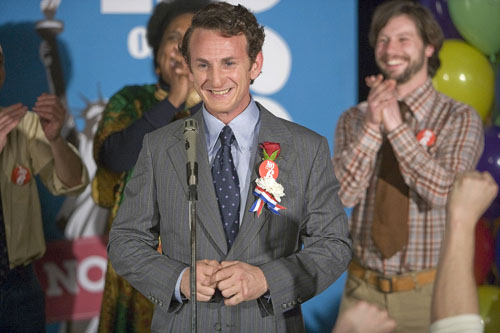
The year 2008, like many election years, was a big one in terms of politics—and political films: Che, Nothing But The Truth, Frost/Nixon, W. and, of course, Milk.
Though not quite as financially successful as other movies released in 2008, Gus Van Sant’s Milk was certainly one of the most decorated: It was nominated for eight Academy Awards and took home two—best actor (Sean Penn) and best original screenplay (by Dustin Lance Black).
The theater will be showing the emotionally wrenching biopic Memorial Day weekend. The timing is appropriate, in my opinion, to commemorate not only those who fought in foreign wars but also those who fought for freedom within U.S. borders.
The movie is about Harvey Milk, “the first openly gay man elected to any substantial political office in the history of the planet,” according to Time magazine. Milk chronicles the story of how Harvey went from being a friendly, chipper camera-store owner to a friendly, chipper, significantly more confident politician in San Francisco.
Not only does the film tell Milk’s story of getting from point A to point B, it also shows how he impacted individual lives as well as the issues of gay rights, awareness and acceptance.
It’s one of the few movies where the ending is revealed from the get-go, though this is usually the case with biopic films involving assassinations. This does not make Milk any less enjoyable, however: It’s all about the story, not a happy ending. Anyway, Sean Penn doesn’t do happy endings.
Milk’s opening credits feature archival footage from the ’50s and ’60s of police raiding gay bars and arresting patrons. Contrary to the mood the credits establish, the entire film is incredibly hopeful and positive, even in times of despair and failure.
The film opens with Milk recording his will nine days before his assassination, setting up the narration and the film’s frequent jumps back and forth between past and present.
Van Sant makes use of copious amounts of archival footage from interviews, debates, newsreels and public speeches. The material makes for a powerful storytelling device that demonstrates the subject’s historical significance, and the reels elicit both compassion and outrage from the viewer.
The film also uses photographs to serve as transitional or artistic devices. They’re left behind after the first half, leaving the viewer to focus more on the story and less on the artistry of the editing.
Penn took home his second Oscar statuette for his portrayal of Harvey Milk, and rightfully so. It was a subtle yet effective thing of beauty to watch his character evolve. Even his vocal patterns and intonations change to mirror his character’s growing confidence.
Penn has established a reputation in his personal life for being, shall we say, less than personable. He frequently chooses somber and serious roles, and as a result he’s also known for being one of the more emotionally moving actors in Hollywood.
In Milk, he plays his polar opposite: amiable, cheerful, positive, appealing to multiple types of people; Penn’s very talented at faking it.
Milk
510 SW Hall St.
Friday, May 24, and Saturday, May 25, at 7 and 9:30p.m.
Sunday, May 26, at 3 p.m.
Free with student ID
Honorable mention in the acting category goes to Josh Brolin, playing Dan White, the initially subtle antagonist whose desperation manages to incite the audience’s empathy while simultaneously making viewers despise him.
There are other political antagonists in the film, including Anita Bryant, who only makes appearances via archival footage; in other words, you can’t make up some of the stuff she said.
There’s also John Briggs—the biggest opponent of gay rights and what Milk represented in general—played by Denis O’Hare, an openly gay actor. Van Sant, who was nominated for best director, screenwriter Black, who won for his screenplay, and the film’s two producers are just a few of the players involved who are also openly gay.
For whatever reason, this film tends to be shown when there’s something substantial happening in the world of gay rights.
Milk was first released mere weeks after the November election in which Proposition 8 passed the California ballot, restricting the recognition of marriage to opposite-sex couples. Who knows—had the film been released earlier, there might have been a different outcome in the vote.
And now, as the film is set to play on campus, Gov. Mark Dayton just signed a bill making Minnesota the 12th state to legalize gay marriage. Harvey would be proud.

